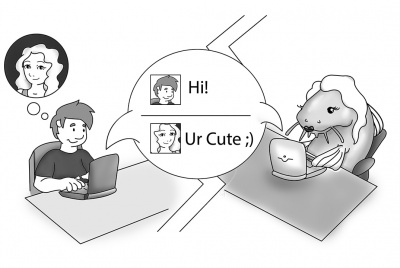Online Dating - Catfishing Edition
Catfishing refers to an action performed by someone who utilizes another person’s online identity to seek out friends or love interests. A few reasons someone may be more inclined to use a false online identity include but are not limited to: low self esteem, depression or anxiety, seek revenge, explore their sexuality, and to seek out revenge or harassment.[1] The idea of catfishing has long been a part of society but it did not get it’s name until 2010 when Nev Schulman released a film about his journey meeting a woman he was chatting with online and then discovering that she was not the person she identified herself as. From then on, many people seemed to identify with the film because they had similar stories which caused Nev to create a TV Show to share those stories.
Catfishing affects people in certain communities more than others whether that be in relation to race, gender, or sexual orientation. Catfishing is also done by certain communities more than others. As stated previously, many people utilize online profiles to impersonate and at times, deceive others. However, impersonation can be utilized for certain employment purposes that require it.
Demographics
According to a source that gathers data from the FBI database, the demographics of those who perform these acts seem to come from Alaska as of 2021.[2] Right behind Alaska, it is claimed that Nevada and Wisconsin are also very prominent in catfishing cases. On the contrary, states with few cases include: Vermont, South Dakota, and Montana. Once people report these cases of being catfished where scams are involved, states calculate the amount lost and add those numbers up over the course of the year. Wisconsin being in the midwest is among the most dangerous scamming states.[3]
A company did their own research on their community members to see who has catfished before. Their data suggested that 1 in 5 people out of 16,827 have impersonated someone else online to favor others.[4]
They also found that 25% of men pretended to be someone else versus 18% of the women who participated in the poll. They also found data in relation to race and ethnicity. About 28% of people who identify as Asian use a different social media identity than themselves. Following this is 23% for people who identify as Hispanic and 20% for people who identify as African American. [5]
Catfished: TV Show
The 8 season show stemmed from the movie created by Nev Schulman about his experience with a woman whose online identity was not her true identity. Schulman also can get credited for creating the word which he came up with after a conversation with the woman and her husband. Schulman then started the show to share more stories of people who related to his situation of being catfished. Schulman and Max Joseph then co-hosted 7 seasons of Catfish with one another, traveling across the nation to find out if someone’s lover was really them or an impersonation of someone else. The show is currently on its 8th season with Schulman and now Kamie Crawford. [6]
In one particular episode, Shulman and Joseph went with a person that requested to be on the show to find the person he was communicating with for several months and who he thought was the love of his life. They approached the house and the person that appeared was a man who had been impersonating a woman online. The discussion they had when they finally met was filled with anger and disappointment.
Ethical Concerns
The many options of social media applications to engage in gives people a plethora of opportunities to interact with other people however they choose. This wide variety of social media applications allows for the possibility of one to interact with someone whose online presence is not their true self. In desperation of a friend, companion, or lover, one may engage in internet relationships that may be temporary. If these relationships shift from being temporary, people invest more of their time and oftentimes money on these people they are getting to know through an online persona that may not belong to the person they are communicating with.
References
- ↑ "Signs of Catfishing", WebMD, https://www.webmd.com/sex-relationships/signs-catfishing
- ↑ "States with the Highest Catfishing Rates", https://bestvpn.org/catfishing-statistics/
- ↑ "...Wisconsin among top states for romance scams", 2019, June 6, https://www.postcrescent.com/story/life/2019/06/06/catfishing-statistics-wisconsin-ranks-no-3-romance-scams/1365159001/
- ↑ "Men Are More Likely Than Women To Catfish", 2019, May 15, https://gobranded.com/men-likely-women-catfish/
- ↑ "Men Are More Likely Than Women To Catfish", 2019, May 15, https://gobranded.com/men-likely-women-catfish/
- ↑ "Catfish: The TV Show", https://en.wikipedia.org/wiki/Catfish:_The_TV_Show,

